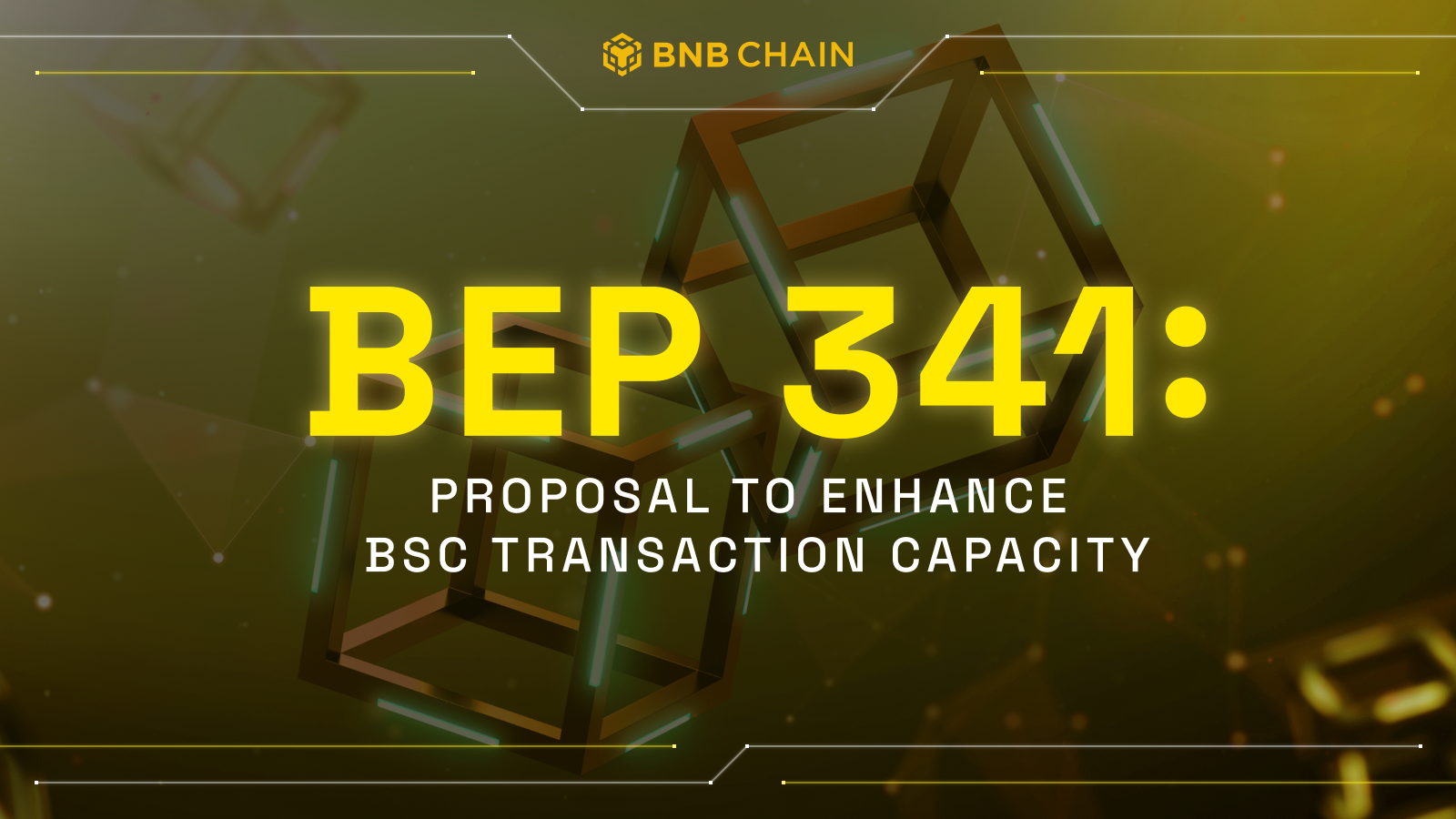Chains
BNB Beacon Chain
BNB ecosystem’s staking & governance layer
Developers
Solutions
Tokenization
Get Your Business Into Web3
Ecosystem
Community
BEP 341: Consecutive Block Production

The recently proposed BEP 341 aims to enhance the transaction processing capacity of the BNB Smart Chain (BSC). This proposal introduces a tried and tested approach where validators can produce consecutive blocks, a significant shift from the current single-slot priority system. In today’s blog, let’s look at how this impacts BSC and the BNB Chain community.
The BEP 341 proposal is now live on the BNB Chain forum where you can join in the community discussion and input your feedback.
Motivation Behind BEP 341
The primary motivation for BEP 341 is to optimize block production efficiency and increase transaction throughput on BSC. By allowing validators to produce consecutive blocks, the blockchain can significantly enhance its capacity, addressing the increasing demands of the active and evolving BSC ecosystem. However, this approach also introduces potential risks such as MEV abuse, necessitating careful governance and monitoring to balance performance improvements with security.
Key Elements of BEP 341
Before we proceed, let’s understand the two key parameters of the block production process introduced by BEP 341.
- Number of Consecutive Blocks (n): This parameter defines the number of consecutive blocks that each validator can produce within each epoch.
- AntiMEV Ratio: To counteract potential maximal extractable value (MEV) abuse, this setting adjusts the transaction fees’ split to the SystemRewardContract. As the validator's consecutive block priority increases, the transaction fees’ split to the SystemRewardContract increases linearly, capped by the systemRewardAntiMEVRatio. The initial setting is 0, and changes to this parameter also require governance approval.
Consecutive Block Production
Currently, validators in BSC obtain priority block-producing rights for a single slot, rotating in a fixed order. This results in a transaction processing limit split between validating transactions from the previous block and processing new transactions.
BEP 341 proposes that validators obtain priority block-producing rights for a continuous sequence of n slots per round, optimizing transaction processing efficiency. The proposal specifies that subsequent blocks in a validator's sequence can skip the transaction validation process, focusing entirely on new transaction processing.
This adjustment leads to a significant improvement in Transactions Per Second (TPS), particularly when the number of consecutive blocks is within the range of 3 to 5.
Specifications for implementation
- The allocation of priority block-producing rights will be predefined for each epoch, ensuring a fair and unbiased process.
- The validator set will switch each epoch to prevent block forging, with the new set chosen to maintain network security and decentralization.
- To prevent fewer than half of the nodes from controlling the entire network, block producers must produce fewer than n blocks within the previous ((validatorN/2+1)*n-1) historical blocks.
Combatting MEV with AntiMEV Ratio
To prevent MEV extraction during consecutive block production, BEP 341 increases the transaction fees’ split to the SystemRewardContract linearly with the block number, capped by the systemRewardAntiMEVRatio.
This approach ensures that validators promptly package transactions, mitigating the risk of MEV abuse and maintaining fairness within the network.
As BSC has already implemented PBS (Proposal Builder Separation), more MEV rewards will actually be included in the gas fees. Therefore, the systemRewardAntiMEVRatio will be more effective as more validators adopt PBS.
Benefits of BEP 341
- Improved Block Production Efficiency: By allowing validators to produce consecutive blocks, BSC can significantly improve its block production efficiency, enhance transaction throughput, and meet the demands of its growing ecosystem.
- Enhanced Decentralization: BEP 341 signals a move towards greater decentralization, with community-driven governance ensuring that changes are made with the consensus of BNB delegators. This approach fosters a more decentralized and resilient network.
- Fair Revenue Distribution: The proposal ensures that validators' and delegators' revenue is fairly distributed, even as block production efficiency improves. The AntiMEV mechanism ensures that high-performance validators do not gain an undue advantage, promoting fairness across the network.
Conclusion
A key part of BEP 341 is its focus on governance and community input. Changes to the number of consecutive blocks and the AntiMEV ratio need community approval, showing BSC's commitment to listening to its users. This proposal ensures that all BNB delegators have a say in the decision-making process.
By enhancing transaction processing capacity and involving the community in governance, BEP 341 underscores the importance of adaptable, community-driven governance in blockchain ecosystems.
Follow us to stay updated on everything BNB Chain
Website | Twitter | Telegram | Facebook | dApp Store | YouTube | Discord | LinkedIn | Build N' Build Forum